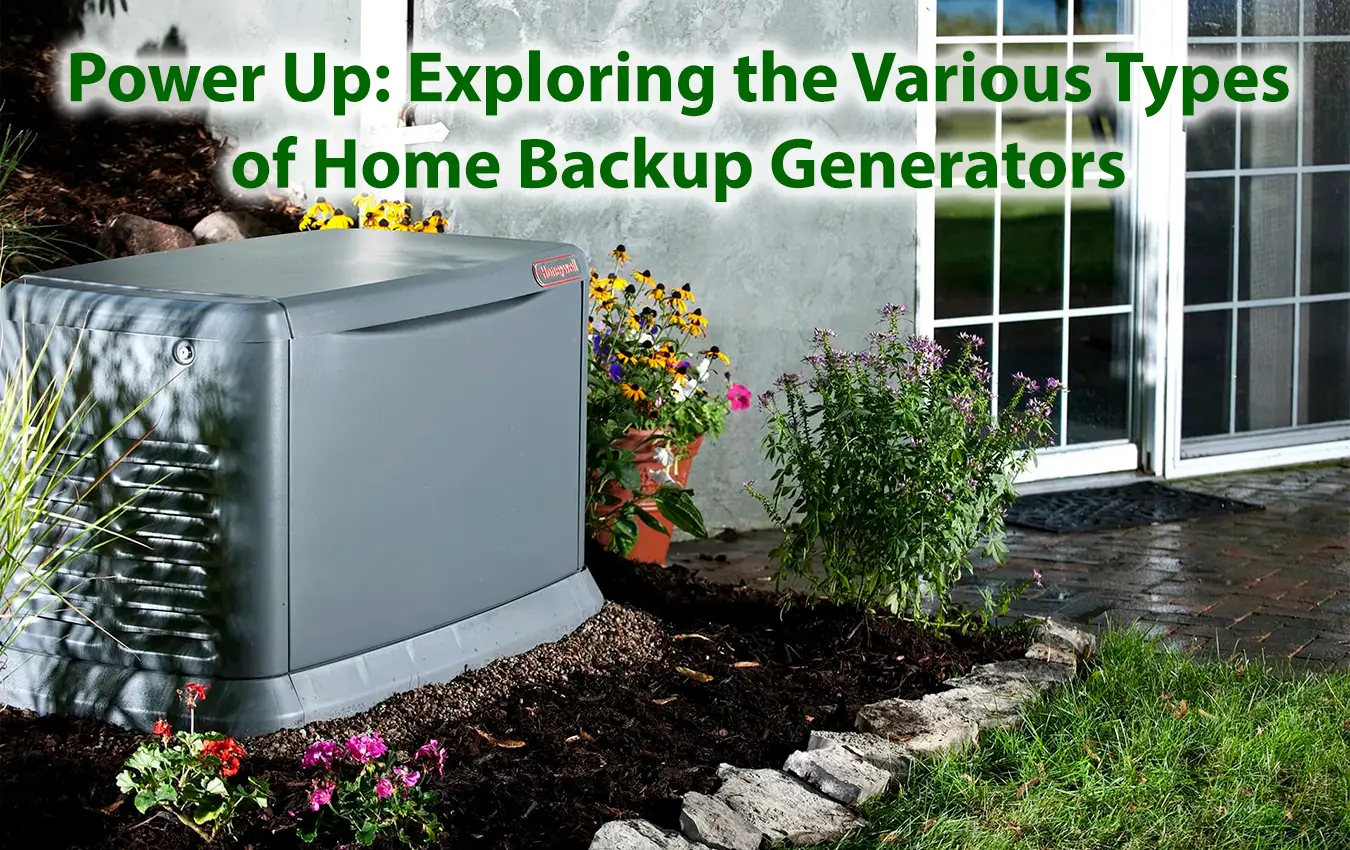Have you ever experienced a power outage that disrupted your daily activities, work, or entertainment? If so, you know how frustrating and inconvenient it can be. That’s why having a home backup generator can be a smart and practical solution. A backup generator can provide you with reliable power when you need it most, keeping your essential appliances and devices running smoothly.
But how do you choose the right backup generator for your home? There are many types of generators available, each with its own advantages, disadvantages, and features. In this article, we’ll explore the various types of home backup generators, from traditional fuel-powered generators to modern solar-powered generators. We’ll also discuss the factors to consider when choosing a home backup generator, such as power requirements, fuel availability, noise levels, environmental impact, and budget. Let’s get started!
Traditional Fuel-Powered Generators
When it comes to backup power solutions for your home, traditional fuel-powered generators remain a popular choice. In this section, we’ll delve into one of the most common types: gasoline generators.
Gasoline Generators
Gasoline generators are a staple in many homes due to their affordability and easy availability. However, like any other device, they come with their own set of advantages and disadvantages.
Advantages and Disadvantages of Gasoline Generators
Advantages
- Availability: Gasoline is widely available and easy to procure, making gasoline generators a convenient choice.
- Cost-effective: These generators are typically less expensive to purchase than other types of generators.
- Portability: Many gasoline generators are designed to be compact and lightweight, making them easy to move and store.
Disadvantages
- Fuel storage: Gasoline has a short shelf-life and requires safe storage conditions to prevent accidents.
- Noise: Gasoline generators can be quite loud, which may be a concern in residential areas.
- Maintenance: These generators often require more maintenance than other types to keep them running efficiently.
Suitable Applications and Scenarios for Gasoline Generators
Gasoline generators are ideal for infrequent use and short-term power needs, such as during a power outage. They’re also a good choice for outdoor activities like camping or tailgating, where portability and immediate power are essential.
Diesel Generators
Diesel generators are another common type of traditional fuel-powered generator. They operate using diesel fuel, known for its efficiency and reliability.
Advantages and Disadvantages of Diesel Generators
Advantages
- Fuel Efficiency: Diesel generators are known for their fuel efficiency. They can produce more power per gallon of fuel compared to other generator types.
- Durability: These generators are typically robust and built to last, making them a good long-term investment.
- Less Maintenance: Unlike gasoline generators, diesel units require less maintenance, as they don’t have spark plugs or carburetors.
Disadvantages
- Noise: Like gasoline generators, diesel units can be noisy, although newer models have improved in this regard.
- Initial Cost: Diesel generators are typically more expensive upfront than gasoline models.
- Fuel Storage: Diesel fuel also has specific storage requirements and a limited shelf life.
Diesel vs. Gasoline Generators: What’s the Difference?
While both types can provide reliable power, there are key differences:
- Fuel Efficiency & Running Cost: Diesel generators are more fuel-efficient, making them cheaper to run over time despite the higher initial cost.
- Maintenance: Diesel generators generally require less maintenance than gasoline generators.
- Lifespan: Diesel generators often have a longer lifespan due to their robust construction.
Never let a power outage interrupt your life again! With Premier Electrical Service’s Generator Installation Services, you can enjoy continuous power supply even during severe outages. In Florida, where power outages are frequent and can last for days, having a reliable backup power system is not just a luxury but a necessity. Call to learn more: 954-900-1696.
Propane and Natural Gas Generators
Propane and natural gas generators offer a reliable, eco-friendly solution for home backup power. Let’s examine their advantages, disadvantages, and key considerations for installation.
Advantages and Disadvantages of Propane and Natural Gas Generators
Advantages
- Clean Burning: Both propane and natural gas burn cleaner than gasoline or diesel, producing fewer harmful emissions1.
- Long Shelf Life: Unlike gasoline or diesel, propane and natural gas have an indefinite shelf life.
- Quiet Operation: These generators operate more quietly than their gasoline or diesel counterparts.
Disadvantages
- Fuel Cost: Propane and natural gas can be more expensive than other fuels, especially in areas where they’re not readily available.
- Lower Power Output: These generators typically produce less power per unit of fuel than diesel or gasoline generators.
Key Considerations for Installation
When installing a propane or natural gas generator, keep the following in mind:
- Ventilation: Proper ventilation is crucial to prevent carbon monoxide build-up.
- Fuel Supply: You’ll need a reliable source of propane or natural gas. This could be a local utility or a standalone propane tank.
- Professional Installation: Due to the complexities of connecting to a gas line, professional installation is strongly recommended.
Inverter Generators
In our exploration of home backup generators, we now turn to a more modern solution: inverter generators. These innovative devices offer a unique blend of efficiency and technology.
How Inverter Generators Work
Unlike traditional generators that produce AC power, inverter generators first produce AC power, then convert it to DC, and finally invert it back to clean AC power. This complex process results in a steady and stable power output, perfect for sensitive electronics like computers and televisions.
Benefits of Inverter Generators
Inverter generators come with several advantages that make them an attractive option for home backup power:
- Fuel Efficiency: They adjust engine speed to match the power demand, making them more fuel-efficient than traditional generators.
- Quiet Operation: Inverter generators tend to run more quietly due to their advanced technology and smaller engines.
- Clean Power Output: The inversion process results in cleaner power, which is ideal for sensitive electronics.
Ideal Scenarios for Using Inverter Generators
Inverter generators are best suited for scenarios where you need portable power or a quieter operation:
- Camping and Tailgating: Their lightweight and quiet operation make inverter generators perfect for outdoor recreational activities.
- Home Office: If you’re working from home and need to power sensitive electronics, an inverter generator can provide clean, reliable power.
- Emergency Backup: For homes with smaller power needs or those wanting to power select appliances during an outage, inverter generators can be a good choice.
Solar-Powered Generators
In our article “Power Up: Exploring the Various Types of Home Backup Generators,” we’ve examined various traditional and modern generators. Now, let’s turn our attention to a type that harnesses renewable energy: solar-powered generators.
Overview of Solar-Powered Generators
Solar-powered generators use photovoltaic (PV) panels to convert sunlight into electricity. This electricity can be used immediately or stored in batteries for later use. Unlike other generators, they don’t require fuel, making them a sustainable choice for home backup power.
Advantages of Solar-Powered Generators
Solar-powered generators come with several benefits:
- Eco-friendly: They produce clean, renewable energy, reducing your carbon footprint.
- Low Operating Costs: Once installed, solar generators have minimal operating costs. The sun’s energy is free!
- Quiet Operation: These generators operate silently, avoiding the noise associated with traditional generators.
Considerations for Choosing a Solar-Powered Generator
When considering a solar-powered generator, bear in mind the following:
- Sunlight Exposure: Your location and the amount of sunlight it receives will directly impact the generator’s performance.
- Battery Capacity: The generator’s battery capacity will determine how much power can be stored for use during nighttime or cloudy days.
- Initial Cost: Solar-powered generators can be more expensive upfront due to the cost of PV panels and batteries.
Battery Backup Systems: Reliable Power at Your Fingertips
Let’s now look into battery backup systems. These systems store electricity for use during power outages, providing a seamless transition to backup power.
Understanding Battery Backup Systems
Battery backup systems, also known as Uninterruptible Power Supply (UPS) systems, store electricity in batteries while your main power source is available1. In the event of a power outage, they automatically switch to battery power, ensuring continuous operation of connected devices.
Benefits of Battery Backup Systems
Battery backup systems provide a variety of advantages:
- Seamless Transition: Unlike generators that can take a few seconds to start, battery backup systems provide instant power during an outage.
- Quiet Operation: They operate silently, making them ideal for environments where noise is a concern.
- Protection: By providing clean, steady power, they protect sensitive electronics from power surges and fluctuations.
Limitations and Considerations of Battery Backup Systems
While battery backup systems offer many benefits, they also have some limitations:
- Limited Run Time: Depending on their size and capacity, these systems can only provide power for a limited time.
- Maintenance: Batteries may need to be replaced periodically to maintain optimal performance.
- Capacity: You’ll need to ensure the system’s capacity matches your energy needs.
Hybrid Generators
In our journey through the various types of home backup generators in “Power Up: Exploring the Various Types of Home Backup Generators,” we now venture into the world of hybrid generators. These versatile units combine the benefits of different generator types, offering a flexible solution for your power needs.
Exploring the Concept of Hybrid Generators
Hybrid generators are designed to use more than one fuel source or technology, such as gas and solar or diesel and battery. This dual-mode operation offers flexibility, helping you make the most of available resources while also catering to changing energy demands.
Benefits and Features of Hybrid Generators
Hybrid generators come with several unique benefits and features:
- Fuel Efficiency: By using multiple fuel sources, hybrid generators can optimize fuel usage based on availability and cost.
- Versatility: They can adapt to different power requirements, making them suitable for a wide range of applications.
- Reduced Emissions: Hybrid generators often result in lower emissions compared to traditional single-fuel generators.
Suitability for Different Applications
Hybrid generators can be a great fit for various scenarios:
- Remote Locations: In areas with limited fuel access but ample sun or wind, a hybrid generator can harness renewable energy while keeping a fuel option for backup.
- Home Use: For homeowners wanting to balance cost, efficiency, and environmental impact, a hybrid generator can be an excellent choice.
- Events and Camping: Their versatility makes hybrid generators perfect for outdoor events, camping, and RV use.
Factors to Consider when Choosing a Home Backup Generator
It’s time to discuss how to choose the right generator for your needs. From power requirements to budget, several factors can influence your decision.
Power Requirements and Load Calculations: The first step in choosing a home backup generator is understanding your power needs. This involves calculating the total wattage of all the appliances and devices you need to power during an outage.
Fuel Availability and Storage Needs: Consider the type of fuel the generator uses (e.g., gas, diesel, propane, solar) and its availability in your area. Also, think about storage needs, as some fuels require special storage conditions.
Noise Levels and Environmental Impact: Noise level is another crucial factor, especially if you live in a densely populated area. Some generators can be quite loud, while others, like solar or battery backup systems, operate silently. Also, consider the environmental impact of the generator’s operation, including emissions and fuel consumption.
Budget Considerations: Finally, consider your budget. While the initial cost of the generator is important, don’t forget to factor in ongoing costs such as fuel, maintenance, and potential battery replacements.
Conclusion
In this article, we explored the various types of home backup generators, from traditional fuel-powered generators to modern solar-powered generators. We also discussed the factors to consider when choosing a home backup generator, such as power requirements, fuel availability, noise levels, environmental impact, and budget.
We hope this article helped you understand the different types of home backup generators and how to choose the best one for your needs. Thank you for reading our article. If you need a professional service to install your home backup generator, contact Premier Electrical Service today for a free estimate and consultation. Dial: 954-900-1696.
Check out the latest news:
- Commercial Energy Audit: Spotting the Sources of Energy Waste
- Protect Your Fort Lauderdale Home with Whole-House Surge Protection
- Power Outages in Fort Lauderdale: How to Protect Your Home
- Preparing for a Home Rewiring Project: A Checklist for Homeowners
- 5 Critical Signs You Need a Whole-House Surge Protector






